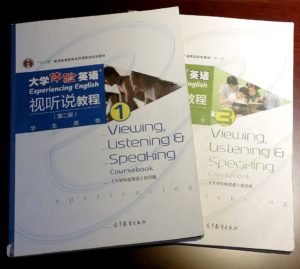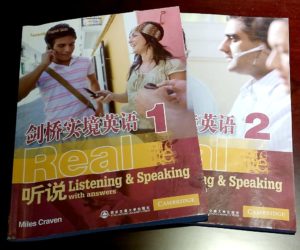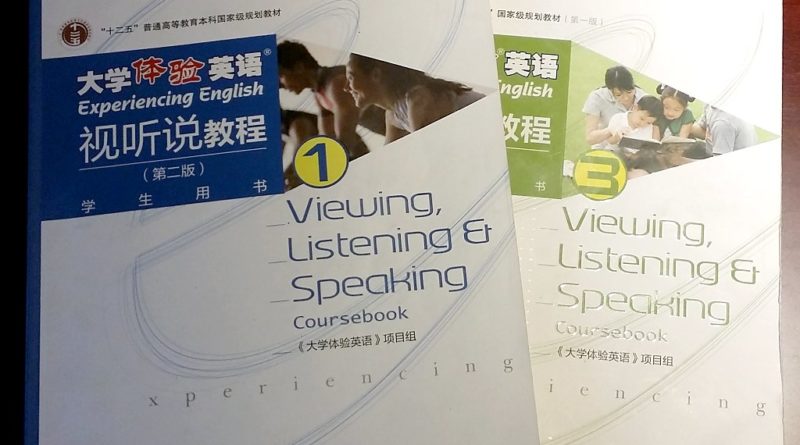When Teaching EFL Should You Use the Textbook?
I’ve just completed my first semester as an EFL teacher. Before that I had taken the CELTA teacher training course. On the course our students we taught followed various textbooks. All of our lessons faithfully followed the book from week to week. Each of the 6 trainees in each group would take one particular section of the book’s chapter. One week I might be doing listening, the other week writing. Our tutors tried to even it out so that we got experience of teaching all four of the basic language competencies.
In other words, we played it safe.
As trainee teachers, I definitely agree with the idea of using a textbook. After all, the CELTA is not the place to experiment. It is an intensive course that follows a teaching methodology that has been proven to get results in the classroom.
However, in the real world classroom, thing are a little different…
I currently teach at a Chinese University. I teach three different streams of students. Two streams have textbooks, the third does not.
After one semester, how have things turned out?
As it happens, I believe that my best classes were actually those in the stream that didn’t actually have a textbook.
One stream had a textbook called Experiencing English. But it was apparent from my first lesson in front of this class that they didn’t think too much of the textbook. The topics weren’t interesting, and even worse, the listening tasks were too difficult for them.

And neither did I like this book. I too found the listening tasks to be difficult! And I am a native speaker. In addition the book claimed there were videos to view for the listening tasks. But when I put the book’s CD in my computer I only found audio files!!!
That wasn’t the only oddity. In one exercise the number of gaps in the gap fill exercise didn’t match the number of points raised in the audio dialogue.
But at the end of the day, it really came down to the topics on offer in the book.
When teaching English classes, it’s essential that the topics interest your audience. For example, on my CELTA course I did one lesson about cooking and baking. Well to my audience of mainly middle aged Spanish housewives, that was one of the best topics I could have picked. The lesson generated so much talking that it almost got out of hand!
My Chinese class’s textbook had a first chapter about global warming. Back when I was in school in the late 1980’s and environmentalism was a huge thing for young people this would have been an excellent topic. But millennials just don’t seem to care so much about environmental issues. So that lesson only really generated tumbleweed when it came to class discussions.
The book’s other topics included:
- College Life. I skipped this chapter because I was teaching sophomore students and the chapter was aimed at freshmen.
- Entertainment. Well this is a great topic but the chapter was too Americanised for my liking.
- Volunteering. This might work back home in the UK but I don’t know enough about Chinese culture to know if volunteering is a thing here. And charity work is a hot potato when it comes to foreigners living in China. So a topic that is best avoided.
- Modern Women. A good topic but I’m of the belief that feminism hasn’t really added that much to the UK’s society. Women seem less happier than in my grandmother’s time. Is this progress? Feminism is also starting to have a negative impact in China as well.
- Great Minds. I tried this but it wasn’t that successful to be honest. One valuable lesson for me though – young people love to watch videos featuring other young people.
- Business and Brands. This was an interesting topic but it didn’t quite work. One of the issues was that the book focussed on Li Ning. He was an athlete who lit the Olympic Torch in the 2008 Beijing Olympic games. Yet as the book points out, his business attempts to make the Chinese Nike haven’t been that successful. In fact none of my students in that class were actually wearing Li Ning sportswear or trainers. So it was a little surreal teaching the Adidas wearing students about Li Ning! The wider issue here is that Chinese people love exporting their stuff, but they like buying imported stuff from other countries. Again, a good topic for an economics lesson but it’s way too complicated for an EFL conversation lesson where I just have to get the students speaking.
- Addictions. Again this is a controversial topic in China given the Opium Wars and the current drug problems in the far South West of the country. And let’s face it hardly any of my students smoke or drink. There’s not even a bar on campus. Of course they are pretty much all addicted to their mobile phones, so that part of the lesson generated a little bit of interest. But I have found time and time again that negative topics do not go down well in China. This is most likely because they are brought up to be naturally upbeat. In fact if you read China Daily you’ll see that there are hardly ever any negative stories, unless the topic is Japan!
Eventually I mostly ditched the textbook for this class, although I did borrow the lesson themes from a couple of chapters.
I took another class and they had a rather better textbook. This textbook was written by a couple of English native speakers. It was also based on British English, and the topics were much more familiar to me.

On the downside the students found the listening exercises way too easy. And while the book had some good activities (particular on the subject of directions), it had very little in the way of usable group activities.
So in summary I’d say that textbooks can fall down because of poor topics selection, or the books aren’t really aimed at the actual grade of your students.
The advice I’d give a new English teacher is to not be too worried if the school doesn’t supply textbooks. Very often they’re not as useful as you might think.
One other problem I found with textbooks is that Chinese students tend to like order and uniformity. In the class they tended to hide in their textbooks. I found that I got them speaking a lot more when they didn’t know what I was going to ask to do next. And of course they couldn’t do the exercises before the day of the lesson itself.
In China generally I’ve found there is too much reliance on learning from books.
So what lessons have worked best in my first semester as an English teacher?
The greatest hits have actually been the easiest to prepare. Here are some really good ones:
- What’s in my bag? I played a few QVC type shopping video clips as the warmer. I filled a shopping bag with 12 different items (can of Red Bull, bag of face masks, Cup Noodle, Pocky, novelty erasers, etc. etc.). In groups I got them to make a sales type presentation about each item. To keep the audience interested I called random names and got them to ask the presenting group a question. The teacher talk time in this class was pretty minimal. It’s a great one if you’re teaching somewhere where you have very limited resources.
- The classic Carousel Task EFL game was highly successful the first time I played it. It can be themed for any topic. I used it to do an investment themed lesson where accountancy students had to form a band in groups then choose an investment company to bank their cash. The twist in the tale was that I would make one bank go bust, and the students who invested in it would “lose” their cash. This was a little less successful in that Chinese students do not like the idea of failure! But it did generate a lot of dialogue. I also did a Carousel Task themed on choosing a school for their kids. They particularly liked being paired up as parents and coming up with some details about how many kids they have!
- Make the students become teachers! OK this is for more advanced students but I got my class of Upper Intermediate students planning EFL games for my class of Lower Intermediate students. Out of this came The Spy Game which has been my fall back activity if the lesson turns out to be under running.
- IELTS Preparation (even if they’re not intending to sit the IELTS exams). Search for IELTS discussion topics online – this will give you dozens of questions about a wide variety of topics. Simply copy and paste the questions into a PowerPoint presentation. Then get the class working on the questions individually or in groups. As a bonus these topics are great preparation for the IELTS exams themselves.
- Chat Shows. Again, for Upper Intermediate students a task where they have to prepare a short chat show is a great lesson, and involves virtually no teacher talk time. Your CELTA tutors will be impressed!
So that’s my report from the teaching trenches. Have you had any good or bad experiences trying to teach from ESL textbooks? Leave your comments below.
And another thing – I’m teaching 22 hours a week next semester. Yikes! If you have any ideas for speaking lessons that require virtually zero preparation time, then leave your ideas below.



